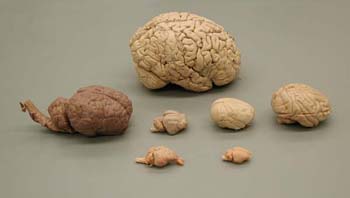Serendip is an independent site partnering with faculty at multiple colleges and universities around the world. Happy exploring!
Computers and Brains/Storytelling
Here is my picture

Brain and Computer
We were talking about the brain and what
methods we could think of to study the brain and its
mechanisms. As we discussed, a lot of research has been able
to show us which parts of the brain are active during certain
activities, and how those parts actually function.
Probably the most comprehensive idea I came up with was to
use computers to imitate the brain, to see if this would help
us to understand it better.
It is possible, in my opinion, that however our brain was
made (and I am not denying either Evolution or God), it was
formed intentially so that we should never understand how it
works. If we did know everything about the brain, then we
would also be able to manipulate it in many ways. This may be
seen as a good thing or a bad thing, depending on how you
look at it. It could have serious moral implications, as we
could reach a stage where peoples' private thoughts were no
longer private, where thoughts could be manipulated, memories
could be erased, the possibilities are endless. Maybe humans
should stop being so arrogant that they think they can do
anything.
On the other hand, we as teachers want to know how the brain
works and how computers could help us. One similarity is that if you give a
computer a command that it has never encountered before and
is not programmed to understand, it will not do it. In the
same way, if a human brain encounters something unknown, like
words spoken in a foreign language, it will not understand.
There is a discrepancy in this however. That is that if you
continue to give this computer the same command over and
over, you will not make any progress. On the other hand, if
foreign language is encountered enough by the human brain, it
will eventually pick it up and learn what it has heard. This
is because there are other factors involved. The human brain
can recognise facial expressions, gestures and even percieve
emotion. In this way, it will eventually learn what is being
said, even though the initial words have remained the same.
Computers cannot recognise emotion or facial expression, they
do not have a body language all of their own, so they do not
have the same capacity for learning that we do.
Anyway, those are some of my thoughts on the matter.
Maybe a bit far-fetched, but I'll let you decide!
http://faculty.washington.edu/chudler/bvc.html

And

Here are some Brain Teasers Sites:
http://bitoffun.com/Brainteasers.htm
http://www.eduplace.com/kids/mhm/brain/gr2/index.html
Here are study notes:
http://www.cs.stir.ac.uk/courses/31YF/Notes/Notes_CB.html



Comments
Science and a Sense of Place
I am in my second week at Brynmawr College. I am taking the Science and a Sense of Place.